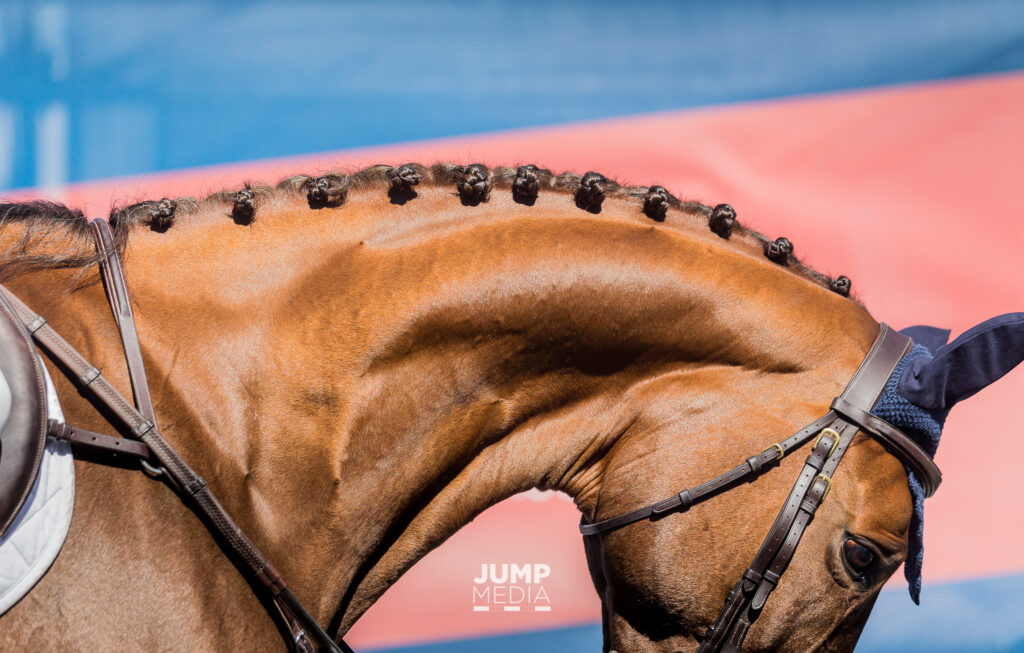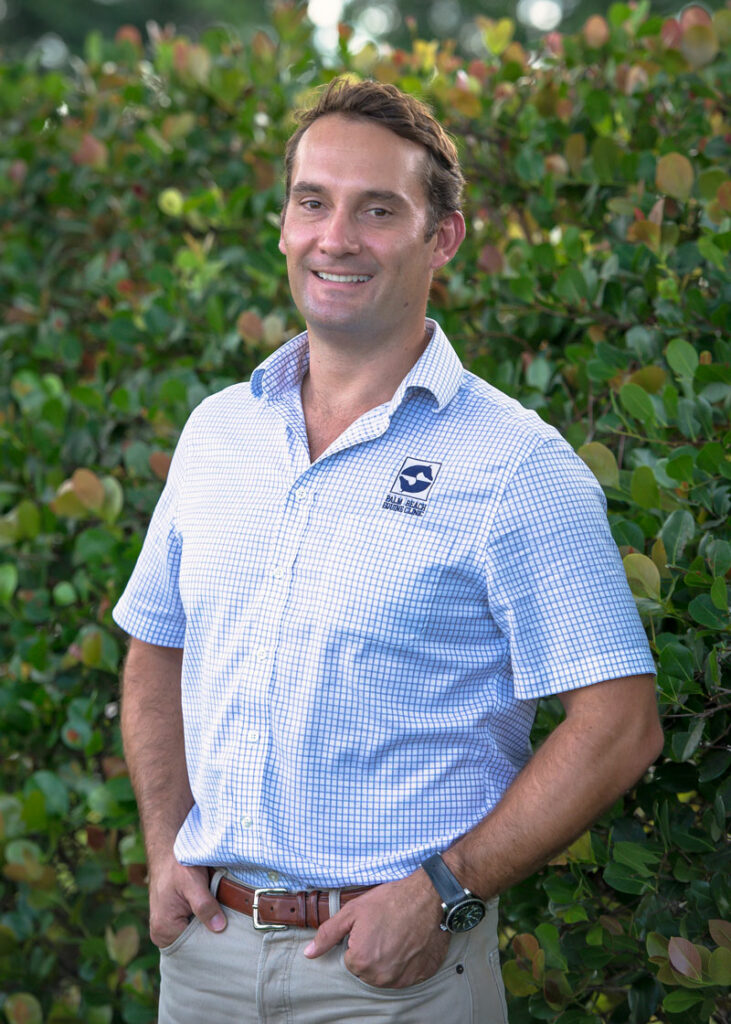Category: News

Colic is every horse owner’s worst nightmare, but when the colicking patient is also pregnant, colic emergencies pose an even bigger challenge for their owner and the team of veterinarians entrusted with their care. In late February, a pregnant mare was brought to Palm Beach Equine Clinic by her owner for colic. Leading the PBEC team on this case were Drs Justin McNaughten DACT, Peter Heidmann, DACVIM, and Elizabeth Barrett, DACVS-LA. We spoke with Dr. McNaughten about the steps he and the team took to keep both the mare and foal safe.
What was the mare’s status when she was admitted to the clinic?
The presenting complaint was colic. At the time of admission, the mare had an elevated heart rate of 120 beats per minute. We then passed a nasogastric tube, which resulted in approximately 15 liters of spontaneous reflux. Once the stomach was decompressed, we proceeded with the rest of the colic work-up. As the mare was in the later stage of pregnancy, the foal occupied the majority of the abdomen. Findings on rectal palpation and abdominal ultrasound were inconclusive. The working diagnosis was ileus or decreased gut motility, but the root cause was still unknown. As part of the medical treatment, the mare had to be fasted. We started her on IV fluids with prokinetics, electrolytes, and dextrose as a source of nutritional support for the foal. Overnight, the mare remained comfortable but continued to have small amounts of reflux. The next morning, she was showing new signs of gas distension, which were not present at the time of admission. An abdominocentesis or ab-tap revealed elevations from the normal peritoneal fluid values suggesting that surgery was warranted.
What factors did you take into consideration before deciding to treat the mare?
When we are dealing with pregnant mares, we often make decisions based on the stage of pregnancy. The biggest obstacle is trying to treat the mare and doing what is safe for the foal in utero. For example, we may use different medications that are safe during one stage of pregnancy and not another, or delay procedures until after the mare delivers the foal. In this case, the owner didn’t have an ovulation date because the breeding had occurred in a paddock. A couple of diagnostic tests can be used to provide a rough estimate of the foal’s gestational age, measuring fetal orbit and the fetal aortic diameter. The results are interpreted as a rough estimate as the reference values have not been determined for each breed. Unfortunately, in the mare, gestation length does not correlate with fetal readiness or her foal’s ability to survive once it’s born. We also performed a diagnostic test to help determine fetal readiness based on evaluating the mare’s mammary secretions. In this case, we specifically measured the pH level.
Based on the mare’s need for colic surgery and the pH levels of her mammary secretions, the team of specialists discussed the options, weighing a fairly extensive list of potential risk factors for the mare and the foal. The owner was presented with the options of performing colic surgery with the foal still in utero or inducing parturition and performing colic surgery once she foaled. At the owner’s request, we induced foaling, which carries its own set of risks and can be life-threatening to both the mare and foal.
In this case, fortune was on our side. Following a successful assisted vaginal delivery, the newborn filly was hitting each of our targets for neonates. Although the filly was not showing any external signs of prematurity, we took radiographs of the knees and hocks as a precaution. The x-rays showed that the filly was a bit premature based on the incomplete ossification of the cuboidal bones, which make up the knees and hocks.
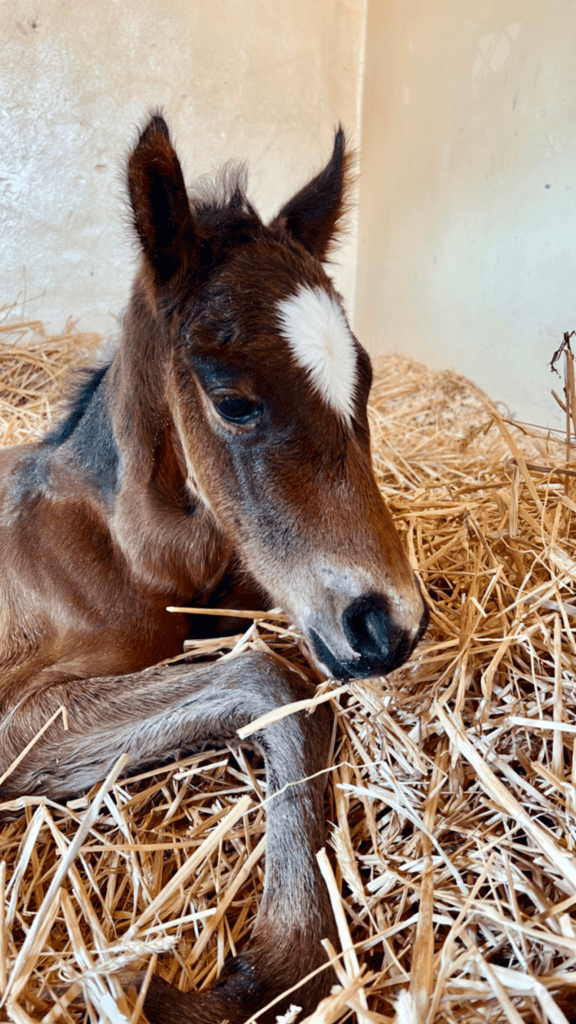
Following the delivery, the mare was then taken into surgery. During the colic surgery, Dr. Barrett identified and removed a very large fecalith, which we assumed was the root of the problem as it had the potential to obstruct the bowel. A fecalith is a hard concretion of ingested material that may increase in size and end up being a blockage in the gastrointestinal tract.
What did their postoperative care look like?
Post-surgery, the mare did very well. While hospitalized, she remained comfortable, tolerated refeeding, and displayed great maternal behavior. The filly was started on prophylactic antibiotics and given milk initially through a feeding tube until the mare had enough milk to sustain the foal. Approximately 48 hours after foaling, the filly developed signs of neonatal maladjustment syndrome, which manifests as neurologic abnormalities. One moment the foal was healthy, bright, and nursing, and the next, she was dull, listless, and disoriented. The condition subsided following IV administration of neuroprotective agents and through the use of the Madigan foal squeeze technique. The Madigan squeeze technique is a physical compression procedure that involves wrapping a foal’s upper torso with loops of soft rope and applying pressure for 20 minutes, which replicates the compression a foal experiences during birth.
Post-surgery, the mare did very well. While hospitalized, she remained comfortable, tolerated refeeding, and displayed great maternal behavior. The filly was started on prophylactic antibiotics and given milk initially through a feeding tube until the mare had enough milk to sustain the foal. Approximately 48 hours after foaling, the filly developed signs of neonatal maladjustment syndrome, which manifests as neurologic abnormalities. One moment the foal was healthy, bright, and nursing, and the next, she was dull, listless, and disoriented. The condition subsided following IV administration of neuroprotective agents and through the use of the Madigan foal squeeze technique. The Madigan squeeze technique is a physical compression procedure that involves wrapping a foal’s upper torso with loops of soft rope and applying pressure for 20 minutes, which replicates the compression a foal experiences during birth.
After a few days, both mare and foal were discharged to the care of the farm. At home, the pair were placed on stall rest followed by additional exercise restrictions allowing time for the mare’s abdominal incision to heal and the filly’s cuboidal bones to fully mature. Now, exactly one month later, I’m happy to say that both the mare and her foal are thriving.
Palm Beach Equine Clinic is available 24/7 for any equine emergency and works regularly with referring veterinarians. For more information, call 561-793-1599.
For Immediate Release
Wellington, FL – March 21, 2022 – Palm Beach Equine Clinic (PBEC) announced the addition of the innovative care program AcutePlus™ to its cutting-edge suite of client services. A long-time leader in equine veterinary care, PBEC is the first veterinary clinic in the United States to offer the service designed to help eliminate barriers to treatment and minimize risk of ownership related to veterinary care.
AcutePlus™ is a wellness-centric preventative care membership program focused on delivering excellence in horse health through preemptive treatments, essential care, and access to acute care.

“We believe that AcutePlus™ is a game-changer for horse owners,” said Palm Beach Equine Clinic President Dr. Scott Swerdlin. “With this innovative program, they can be assured that they have the ability to make the best heath care choices for their horse.”
“We are innovators at VenturePlus™,” said Ghen Sugimoto CEO of AcutePlus™. “It has been a great pleasure to work with such like-minded individuals at the top of their field at Palm Beach Equine Clinic to help them develop a program that further allows them take the very best care of their patients. AcutePlus™ puts Palm Beach Equine clients in the best position to care for their horses particularly on the worst days, when it matters the most. Additionally, we are proud to be able support Palm Beach Equine Clinic’s efforts to mentor up-and-coming veterinarians through donations from our AcutePlus Foundation™.”
PBEC will offer four tiers of AcutePlus™ membership protection to meet the level of coverage needed by each client. AcutePlus™ plans provide a range of concierge member support, customary care benefits, acute medical benefits, and mortality benefits along with exclusive member opportunities, loyalty points, and more.

Signing up is simple at AcutePlus.com.
The AcutePlus™ membership plans have two categories of benefits: customary care and acute medical care and mortality. Customary care benefits cover routine care costs like farm calls, routine vaccinations, dental floats, physical exams, microchips, complete blood counts, and Coggins tests.
Acute medical care is an important component of the extensive benefits offered through AcutePlus™. A platinum membership provides up to $10,000 per year in financial support for acute care medical bills such as surgical and non-surgical colic, choke, lacerations, eye injuries, acute onset laminitis, bowed tendons, fractured leg, and other urgent medical issues. Advanced diagnostics such as MRI and CT scan benefits are also included under the acute medical benefits portion of the plan. If the unthinkable happens and a member horse’s life is lost, AcutePlus™ can also provide up to $150,000 in equine mortality benefits.

Palm Beach Equine Clinic clients enrolled in AcutePlus™ can utilize their benefits with any licensed veterinarian anywhere in the world, not only when using PBEC’s services directly. After enrolling in AcutePlus™, when you use Palm Beach Equine Clinic for services, you maximize your benefits, and they will automatically apply a credit directly to your bill. Your membership benefits will travel with your horse around the globe, no matter how far away from Wellington you travel – extending your world-class veterinary care anywhere in the world.
Please visit AcutePlus.com for additional information or to activate your membership. Whether your horse is a competitor, a companion, or a world champion, there is an AcutePlus™ plan designed for you.
For questions regarding AcutePlus™ at Palm Beach Equine Clinic, call Dr. Scott Swerdlin at 561-793-1599.
About Palm Beach Equine Clinic
Palm Beach Equine Clinic is a full-service medical facility offering care 24 hours a day, 365 days a year. Equipped with a surgical center, advanced diagnostic imaging units, laboratory, pharmacy, reproductive station and breeding shed, recovery stalls, and isolation unit, Palm Beach Equine Clinic has the necessary tools for diagnosing and treating a variety of cases. Palm Beach Equine Clinic is ideally based in the international hub of elite equestrian competition, Wellington, Florida, and is within riding distance of the Winter Equestrian Festival, Global Dressage Festival, and International Polo Club. Palm Beach Equine Clinic is proud to care for all horses, whether they are an Olympic level athlete, trusted show pony or reliable trail horse.
Visit EquineClinic.com to learn more about Palm Beach Equine Clinic and follow them on Facebook, Twitter, and Instagram.
AcutePlus™ benefits vary by membership plan. Benefits referenced in this article reflect the AcutePlus™ Platinum Membership offered through Palm Beach Equine Clinic. Terms and conditions apply. Please visit AcutePlus.com to review all terms and conditions.
Wellington, FL – March 18, 2022 – Palm Beach Equine Clinic (PBEC) is excited to announce a new partnership with Hagyard Equine Medical Institute (HEMI), one of the leading equine medical centers in advanced reproductive medicine. Through the partnership, equine reproductive specialists will work collaboratively with the team at PBEC to expand upon the traditional services currently being offered.
While Dr. Justin McNaughten and Dr. Robert Smith will lead the team in Wellington, Dr. Karen Wolfsdorf, Dr. Karen Von Dollen and Dr. Kristina Lu from HEMI will provide assistance with advanced reproductive services. Dr. McNaughten received his BVMS from the University of Glasgow, School of Veterinary Medicine in Glasgow, UK. After completing a fellowship and residency he became a board-certified theriogenologist working in early embryonic loss, mare infertility, and stallion behavior as well as general reproduction and assisted reproductive techniques.
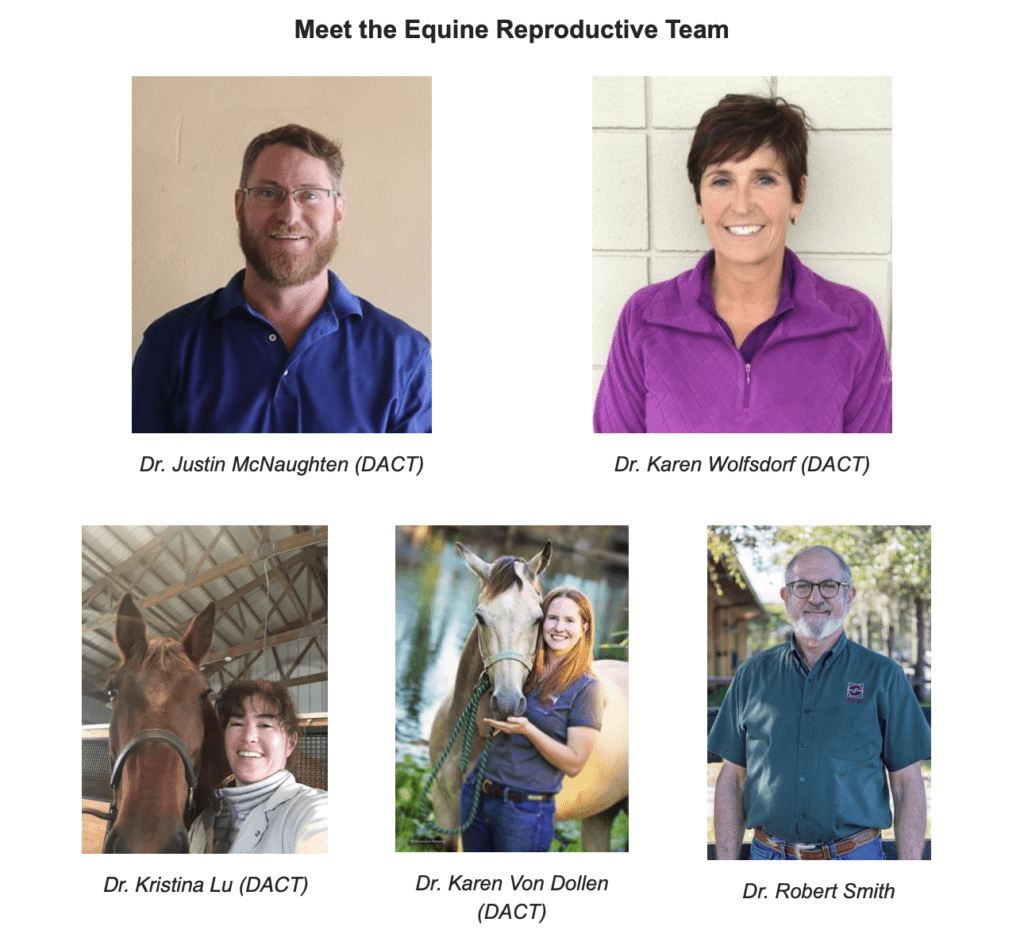
“It’s a new adventure using the equine reproductive specialists from HEMI to work collaboratively with Palm Beach Equine,” McNaughten commented. “The big thing is to tap into the more advanced artificial assisted reproductive techniques specifically for our sport horse and competition mares.”
Dr. Wolfsdorf emphasized that the partnership between the two clinics helps to provide a streamlined approach to their equine patients throughout the year. “Horses travel, so when they move north, to Kentucky per se, they’ll get the continued specialized care. It may not be the same individual but as a team, there will be open communication,” she explained.

One of the advanced services that will be incorporated into PBEC’s reproduction program is Transvaginal Aspiration (TVA) of the oocyte from the mare’s ovary. Oocytes are processed and shipped to a specialized Intracytoplasmic Sperm Injection (ICSI) laboratory. The ICSI procedure involves the micro-injection of a single sperm cell into a mature oocyte to produce an embryo. Dr. Von Dollen explained, “Oocyte aspiration offers an opportunity to salvage the reproductive potential of subfertile mares or stallions. Furthermore, embryos can be produced without the need to interrupt a mare’s competition schedule for insemination and embryo flushing,” she added.
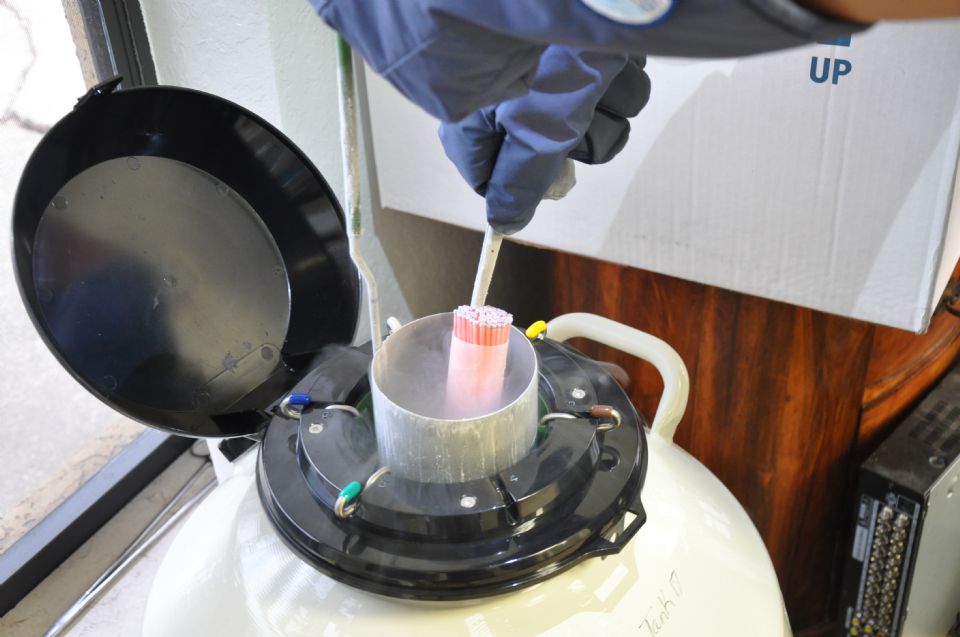
Palm Beach Equine Clinic will offer these new advanced techniques along with all of the traditional services whether at the equine hospital or in a private barn. With expert care and advanced practices, PBEC maximizes the likelihood of a successful pregnancy and to produce the talent of the future.
To learn more about the routine and advanced reproductive services offered this season contact PBEC at 561-793-1599, HEMI 859-255-8741 or visit www.EquineClinic.com or www.Hagyard.com. Follow Palm Beach Equine Clinic and Hagyard Equine Medical Institute on Facebook and Instagram to see more about the clinic, its vets, and those they serve.
Equine Veterinary Care Available at PBIEC Showgrounds Annex Office
One of the world’s premier veterinary facilities, Palm Beach Equine Clinic, will return as the Official Veterinarians of the 2020 Winter Equestrian Festival (WEF) and Adequan® Global Dressage Festival (AGDF) running January 8 through March 29 at the Palm Beach International Equestrian Center (PBIEC) in Wellington, FL.
With the health and welfare of equine athletes a top priority for the upcoming winter show jumping and dressage competition seasons, Palm Beach Equine Clinic will continue more than three decades of service to both the year-round residents and visiting horses of south Florida. The clinic’s world-renowned facility is conveniently located at the intersection of Southfields Road and Pierson Road in the heart of Wellington, just minutes from PBIEC, the Equestrian Village, and the International Polo Club Palm Beach. Palm Beach Equine Clinic comprises over 35 veterinarians, with board-certified surgeons and internists, and robust support by knowledgeable technicians and staff. Palm Beach Equine Clinic offers exceptional veterinary care and an innovative approach to help each horse achieve their full potential in and outside of the show ring.
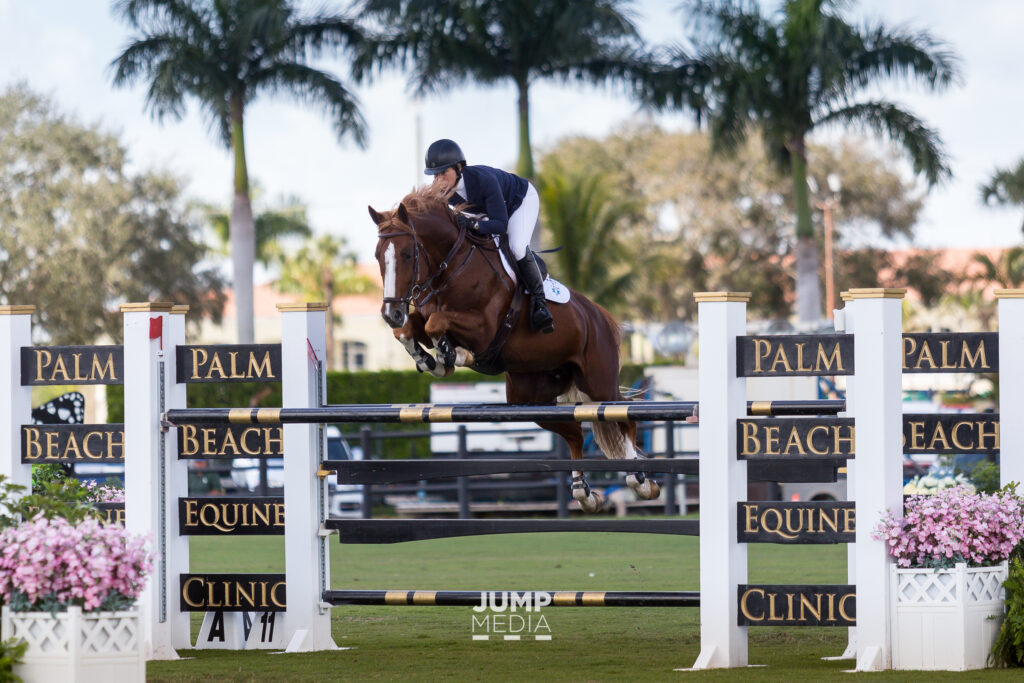
In addition to at the full-service equine hospital, Palm Beach Equine Clinic veterinarians will be available each week to all competing horses at WEF and AGDF thanks to an annex office located adjacent to the WEF stabling office on the PBIEC showgrounds. Palm Beach Equine Clinic veterinarians are on call daily at the annex office to assist competitors throughout the shows with diagnostic evaluations and treatments, as well as emergency and standard horse care needs. Equestrians are always welcome at the annex, where they have the opportunity to discuss their horse health needs with Palm Beach Equine Clinic.
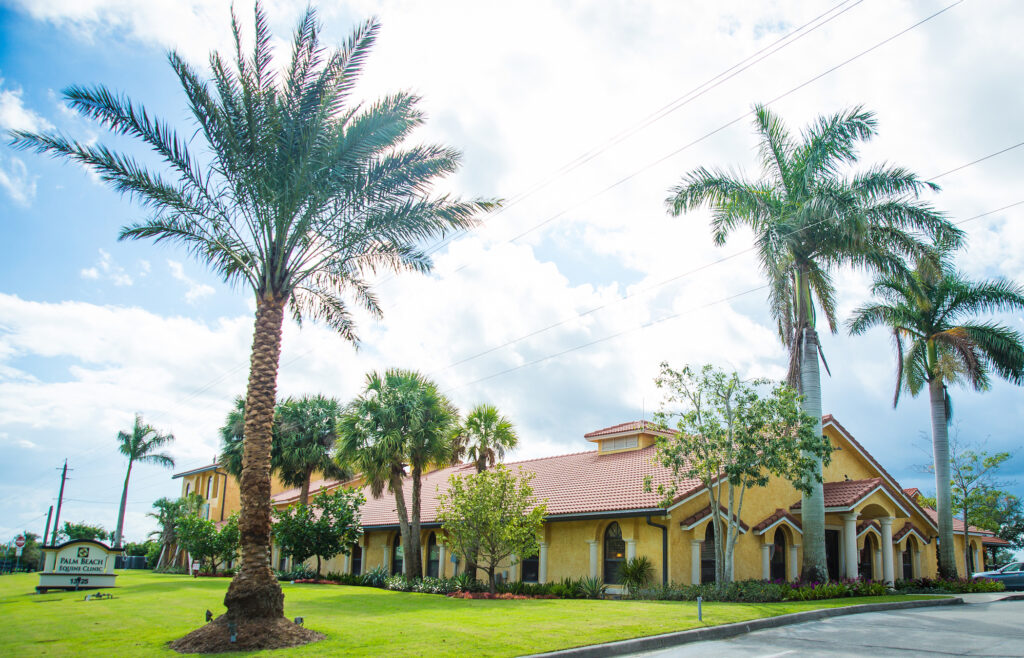
“Combining the unique offerings of our imaging department, renowned surgical talent, diverse veterinary expertise, and overall high standard of treatment allows us to provide services and care that are akin to the Mayo Clinic for human patients,” said Palm Beach Equine Clinic President Dr. Scott Swerdlin. “The Winter Equestrian Festival and [Adequan®] Global Dressage Festival attract some of the world’s top horses to south Florida. Whether we are treating Olympic level athletes or a trusted companion pony, they will receive the most advanced, dedicated healthcare. It takes a team to achieve success in the competitive arena, and we provide one of the best in the world at Palm Beach Equine Clinic.”
Palm Beach Equine Clinic veterinary advances – available to new, returning, and referred clients – include:
Advanced Diagnostic Offerings
- Computed Tomography (CT) Machine
- Standing Magnetic Resonance Imaging (MRI)
- Nuclear Scintigraphy (bone scan)
- Board-Certified Radiologist on Staff
- Digital Radiography and Ultrasonography
Surgical Offerings
- Three boarded surgeons skilled in performance-related injuries
- Standing surgery pit
- Surgical residency program
- Advanced surgical suite
Specialty Offerings
- Internal medicine specialists
- Quarantine facilities with secure isolation and individual airflow systems
- Alternative medicine specialists focused on chiropractic, acupuncture, and Chinese herbals
- Renowned sports medicine specialists
- On-site hospital with 24-hour staff
- Dentistry, ophthalmology, and farriery expertise

In addition to being the Official Veterinarians of WEF and AGDF, Palm Beach Equine Clinic will again participate in WEF’s popular Lunch & Learn education series during the 2020 season. Mark your calendars for a presentation entitled “Modern Medicine for the Competitive Sport Horse: How to Gain and Maintain a Healthy and Sound Show Horse” on Thursday, March 12, at 11:30 a.m. in The Wellington Club at the WEF showgrounds. Admission to the Lunch & Learn series is free for riders, trainers, and owners and includes the opportunity to learn how to help the competitive sport horse achieve and maintain optimal health through advanced technology, innovative approaches, and specialty therapies; a buffet lunch; and a chance to win exciting prizes.
For more information on what Palm Beach Equine Clinic has to offer horses competing at WEF and AGDF, stop by the annex office located next to the stabling office on the WEF showgrounds, visit www.EquineClinic.com, or call 561-793-1599.
The veterinarians of Palm Beach Equine Clinic have always enjoyed contributing to support the local community in Wellington, FL. As a leader in equine veterinary medicine, Palm Beach Equine Clinic makes it a priority to share knowledge and guide aspiring youth. Currently, through Wellington High School’s (WHS) Equine Pre-Vet Program, Palm Beach Equine Clinic has a hands-on program for students to introduce them to a career as promising young veterinary professionals.
Kickstart a Career in Veterinary Medicine
The Equine Pre-Vet Program at WHS provides students with an opportunity to pursue a rigorous, accelerated science program to prepare them for veterinary medicine and/or animal sciences at the college level. Equine Pre-Vet students are required to complete 20 hours of community service in an animal-based area during each year of high school. As a senior in high school, students are also required to intern with an animal healthcare facility, complete research assignments on veterinary medicine, and prepare veterinary case studies.
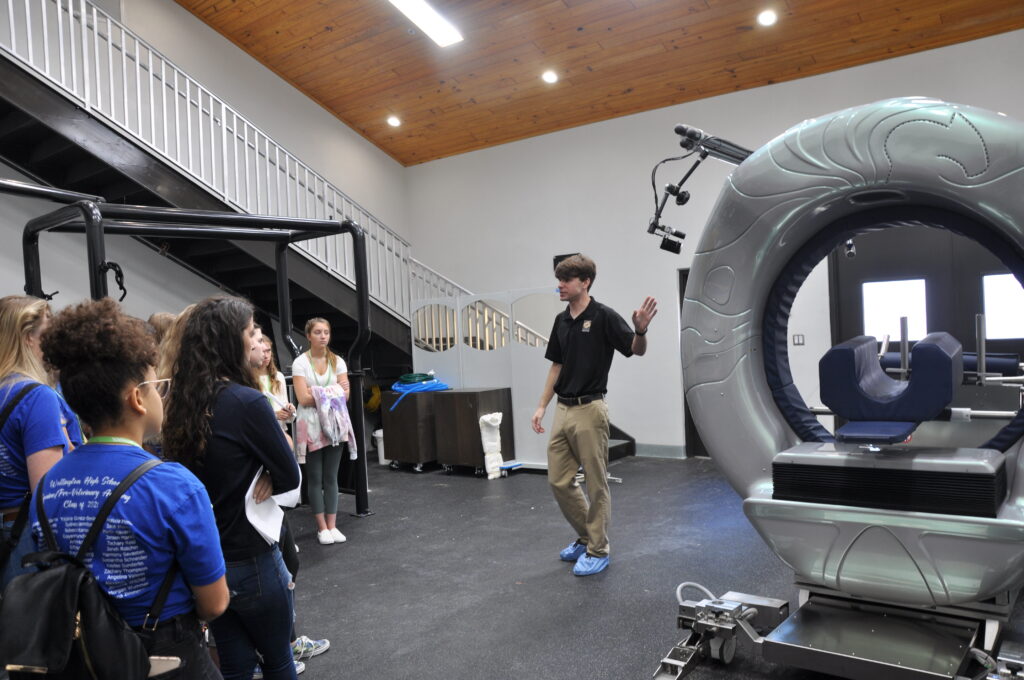
WHS seniors who choose to pursue the Equine Pre-Vet Program have a wealth of knowledge at their fingertips with one of the world’s most advanced equine medical centers just down the road. Palm Beach Equine Clinic is home to more than 30 world-class veterinarians who all know the process of becoming a top veterinarian within the industry.
Learning from a diverse team of veterinarians
Through the program at WHS and the generosity of the veterinarians at Palm Beach Equine Clinic, students in the Equine Pre-Vet Program have the unique opportunity to learn all about the profession from the very best. Seniors in the program are given the chance to shadow veterinarians as they work at the clinic, as well as out on ambulatory calls at the farms. The program requires that each student obtain a certain number of externship hours, but Palm Beach Equine Clinic allows the students to help and observe for as many hours as desired. Many students show a high level of interest and become highly involved at the clinic. Palm Beach Equine Clinic tries to accommodate each student for their participation at every level.
A program is also offered for junior students at WHS who are considering joining the Equine Pre-Vet Program when they become seniors. Junior students are invited to the clinic to learn about various paths in veterinary medicine and tour the facility in small groups. Palm Beach Equine Clinic sets up multiple stations for them to learn about things including blood work, physical exams, reproduction, and business management.

Palm Beach Equine Clinic’s Dr. Janet Greenfield-Davis is very involved with the program and enjoys teaching students of all ages. She has been involved in the local school system’s career day for younger children at the elementary level and also mentors the senior students who have already chosen the veterinary path involved in the externship program.
“We try to play an active role in our community, and we really enjoy having the kids visit the clinic,” said Dr. Greenfield-Davis. “When I went to high school, it was just general education, but now they really specialize in gearing the children towards specific programs in high school, and I think that is pretty impressive. To have PBEC right around the corner is handy for them, and it is nice for us to have the kids come through.
“We have some students that will come in on their own outside of school and ask to volunteer,” continued Greenfield-Davis. “We also have two girls that are in vet school now that started here in high school. They went to local colleges and they continued to come to our practice and participate all through college. We were able to write them recommendations for veterinary school, and they both got in, so we are super proud of them. We try to do all we can for the high school. We are really happy that we can provide those opportunities for the students and see them excel.”
The world-renowned Palm Beach Equine Clinic, Official Veterinarian of the Winter Equestrian Festival (WEF) and Adequan® Global Dressage Festival (AGDF) in Wellington, FL, is the proud sponsor of the $391,000 CSI5* Grand Prix during “Saturday Night Lights” at WEF Week 7.
Who: Some of the world’s most accomplished show jumping athletes. Once finalized, the order-of-go will be posted HERE.
What: The $391,000 Palm Beach Equine Clinic CSI5* Grand Prix
When: Saturday, February 23, during “Saturday Night Lights” at 7 pm ET. Gates open at 6 pm. Free admission and $20/car parking.
Where: Palm Beach International Equestrian Center in Wellington, FL. Directions can be found HERE.
In addition to their sponsorship of this week’s CSI5* Grand Prix and of the 3’3″ Amateur-Owner Hunter 36 and Over division throughout WEF, Palm Beach Equine Clinic also provides state-of-the-art veterinary care to the horses of both the year-round residents and visitors of South Florida. Palm Beach Equine Clinic’s technologically advanced clinic is conveniently located at the intersection of Southfields Road and Pierson Road in the heart of Wellington, just minutes from PBIEC, the Equestrian Village, and the International Polo Club Palm Beach.
The expertise and dedication of Palm Beach Equine Clinic veterinarians is also available to all competing horses at WEF and AGDF thanks to an annex office located adjacent to the WEF stabling office on the PBIEC showgrounds as well as at the main Palm Beach Equine Clinic location. Palm Beach Equine Clinic veterinarians are on-call daily at the annex office to assist competitors throughout the shows with diagnostic evaluations and treatments, as well as emergency and standard horse care needs.
Official Veterinarians of 2019 WEF and AGDF Circuits
World-renowned veterinary facility Palm Beach Equine Clinic (PBEC) will return as the Official Veterinarians of the 2019 Winter Equestrian Festival (WEF) and Adequan Global Dressage Festival (AGDF) running January 9 through March 31 at the Palm Beach International Equestrian Center (PBIEC) in Wellington, FL.
A proponent and supporter of horse sport in Wellington and throughout the world, Palm Beach Equine Clinic has served both the year-round residents and visiting horses of south Florida for more than three decades. PBEC’s state-of-the-art clinic is conveniently located at the intersection of Southfields Road and Pierson Road in the heart of Wellington, just minutes from PBIEC, the Equestrian Village, and the International Polo Club Palm Beach. PBEC’s talented team of veterinarians offers its clients and the horses of referring veterinarians unmatched care and an innovative approach to standard and emergency services.
Palm Beach Equine Clinic’s goal is to provide a definite diagnosis and never have to refer a case. In other words, PBEC is the equivalent of the Mayo Clinic for horses.
“Combining the tools of our imaging department, surgical talent, and overall standard of treatment allows us to provide services far beyond what other facilities can provide,” said PBEC President Dr. Scott Swerdlin, who leads a team of more than 40 veterinarians at PBEC. “But even with all the technology we provide, we need the people to make it all happen. That is exactly what we have; veterinarians skilled in diagnostics, technicians dedicated to caring for the horses before, after, and during any procedure, and world-renowned surgeons who can take a diagnosis and treat the problem with positive results for horse and owner. It takes a team and we have one of the best in the world at Palm Beach Equine Clinic.”
PBEC’s services available to new, returning, and referred clients include:
Advanced Diagnostic Offerings
- Computed Tomography (CT)
- Standing Magnetic Resonance Imaging (MRI)
- Nuclear Scintigraphy (bone scan)
- Board-Certified Radiologist on Staff
- Digital Radiography and Ultrasonography
Surgical Offerings
- Three boarded surgeons skilled in performance-related injuries
- Standing surgery pit
- Surgical residency program
- State-of-the-art surgical suite
- Quarantine facilities with secure isolation and individual air flow systems
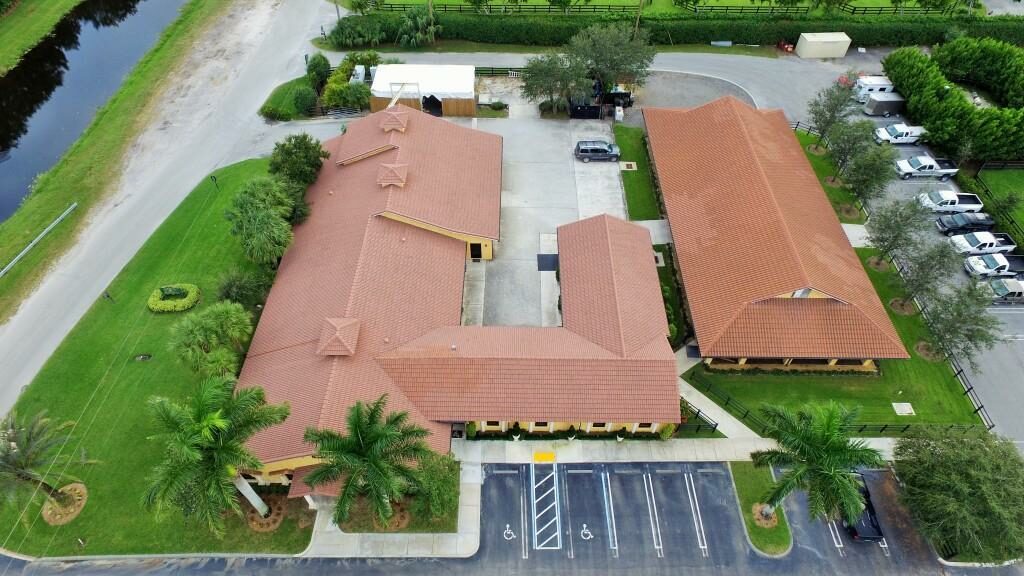
The expertise and dedication of PBEC veterinarians will be available to all competing horses at WEF and AGDF thanks to an annex office located adjacent to the WEF stabling office on the PBIEC showgrounds as well as at the main PBEC clinic location. PBEC veterinarians are on-call daily at the annex office to assist competitors throughout the shows with diagnostic evaluations and treatments, as well as emergency and standard horse care needs.
“Our location, talents, and dedication to the Wellington community and beyond have helped Palm Beach Equine Clinic to offer the best possible care to some of the world’s top equines during the winter show season,” continued Dr. Swerdlin. “Additionally, our annex office places us in the heart of it all, making advanced veterinary care convenient to equestrians competing at Palm Beach International Equestrian Center. We are very proud of both facilities and the veterinarians who work there, but we are even more proud to be trusted with the care of such special animals!”
For more information on what PBEC has to offer horses competing at WEF and AGDF, stop by the annex office located next to the stabling office on the WEF showgrounds, visit www.EquineClinic.com, or call 561-793-1599.
Save The Date
In addition to being named the Official Veterinarians of WEF and AGDF, PBEC’s own veterinarians will again participate in WEF’s popular Lunch & Learn education series during the 2019 season. Mark your calendars for a presentation on Sport Horse Health on Thursday, March 7, at 11:30 a.m. in The Wellington Club at the WEF showgrounds. Admission to the Lunch & Learn series is free for riders, trainers, and owners and includes a buffet lunch and a chance to win exciting prizes from 2019 Lunch & Learn sponsors.
In the past, when a horse’s gait has felt off or lacking in its usual impulsion, it was often assumed to be an issue of lameness. Now however, thanks to the improved diagnostics readily available at the Palm Beach Equine Clinic veterinarians are able to more accurately pinpoint the problem area. Perhaps surprisingly, it’s not always in the legs or hooves. With increasing frequency, the horse’s neck is being diagnosed as the root of the issue.
The Anatomy of the Equine Neck and What Can Go Wrong
In order to understand the problems that can arise in association with the horse’s neck, it’s important to first understand the anatomy.
The neck is composed of seven cervical vertebrae running from the head to the thorax, named C1 through C7, and each articulating with each other. The primary purposes of the neck are to move the head and to protect and transport the spinal cord and nerves, which run through the middle of the vertebrae.
Such a major role as the protection of the nerves and spinal cord can also come with some major risks and complications, with clinical signs of these problems generally presenting themselves either neurologically, as neck pain, or as lameness in the front legs. These more specific symptoms may include:
- Ataxia or clumsiness – Ataxia is defined as the “lack of control of bodily movements”. In the case of an ataxic horse, you may begin to notice staggering, sudden loss of balance, or even an inability to remain upright. Ataxia is generally an indicator of a neurological condition or damage to the spinal cord itself, caused by either developmental issues, trauma, or an infectious disease such as equine protozoal myeloencephalitis (EPM). Such neurological cases can often be the most debilitating.
- Lameness – You can think of the spinal cord and the nerves in the neck like an interstate, with the spinal cord itself acting as the major highway. As you are “driving” along the interstate, every so often there are little exits, which is where the other nerves come out. Should there be any impingement on the interstate or spinal cord itself, you’re likely looking at more severe complications – much like an accident on the highway. Should there be impingement on the nerves coming off of the spinal cord, it will more likely present itself like an accident a little way off an exit – not affecting the interstate itself, but possibly causing problems that spread elsewhere. That is where we see lameness issues arise.
This can be more difficult to pin down, but can often be due to pressure on the smaller nerves that pass through the openings in the vertebrae and supply the front legs. Arthritis of the articular facet joints of the vertebrae is another common reason for lameness, as anytime these joints become arthritic or inflamed, it can easily translate to the forelimbs.
- Neck Pain – This will often go hand-in-hand with lameness, as factors such as arthritis of the articular facet joints can lead to both symptoms. Other possible reasons for neck pain include trauma or inflammatory diseases.
Diagnosing the Problem
Neck problems, particularly those related to lameness, are generally diagnosed through a process of exclusion, first performing nerve blocks to or ruling out lower regions of the horse’s body. Palpation of the neck, testing of the neck’s movement, and full neurological exams may also be performed in addition to a full lameness exam, depending on the horse’s symptoms.
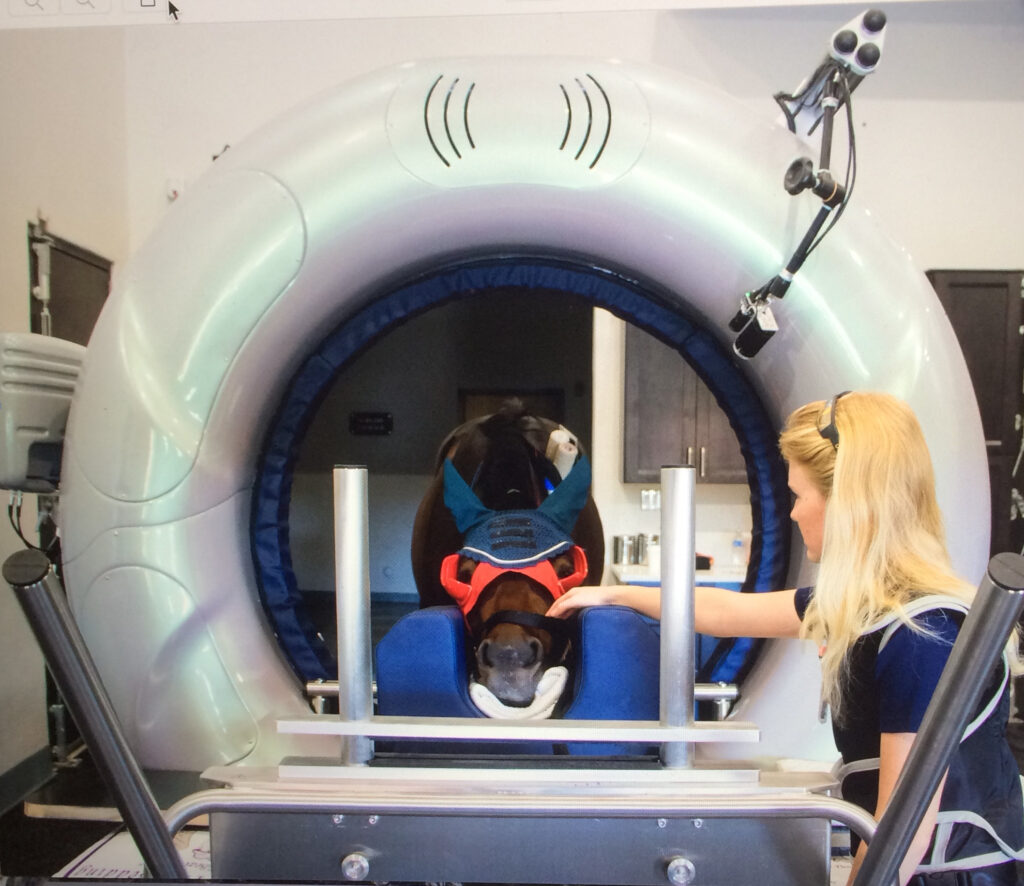
Once other regions of the horse are ruled out as the location of the problem, veterinarians are now able to use diagnostic images such as radiographs, nuclear scintigraphy and standing CT scans to specifically locate problems in the neck like never before.
In years past, those diagnostic resources were left for last-ditch cases when veterinarians really could not pinpoint any other problems. Today, with the advent of more modern technology, better radiographs, better ultrasound machines, and the more advanced imaging of nuclear scintigraphy and CT scans, veterinarians are able to readily utilize advanced diagnostics to save time and money, and to find the root of the problem more quickly and accurately.
The neck is one of the areas that has most clearly benefited from the progression in advanced imaging. While neck problems have likely been prevalent for some time, veterinarians are now finding those diagnoses more common, as they are able to more accurately locate the issue – particularly at clinics like Palm Beach Equine Clinic. Often these issues will go undiscovered or undiagnosed in the field, but they can be identified at Palm Beach Equine Clinic thanks to the readily available imaging tools.
As an example, if arthritic factors are suspected, nuclear scintigraphy can be used to look for areas of increased bone turnover. On the resulting bone scan, veterinarians are looking for areas where there is an increased calcium uptake because the bone is actively remodeling. These areas will appear darker on the scan and are generally a good indicator of a boney injury or arthritis, with the darker “hot spots” often appearing above the articular facet joints.
Also new and groundbreaking for the diagnosis of equine neck problems is the use of a Computerized Tomography or CT scan, with the ability to scan a standing horse with light sedation on the near horizon which will be available at the clinic this upcoming winter season.
Treatment
Once a solid diagnosis is arrived upon, the proper treatment protocols can be prescribed. Depending on the root of the problem, possible treatments may include shockwave therapy, regenerative therapies such as interleukin-1 receptor antagonist protein (IRAP) therapy or platelet-rich plasma (PRP) therapy, or one of the most common treatments, injections of the facet joints.
In the case of facet joint injections, veterinarians at Palm Beach Equine Clinic are able to medicate under ultrasound guidance, guiding a needle into the joints and delivering corticosteroids or similar medication. Surgery is also an option as a final approach to severe complications.
In milder cases, treatments may also just call for increased time off, chiropractic treatments, or the administration of non-steroidal anti-inflammatory (NSAID) medications.
If you suspect any issues with your horse’s neck, contact Palm Beach Equine Clinic any time by calling (561) 793-1599 to schedule an appointment.
Palm Beach Equine Clinic is proud to serve as the local headquarters for emergency services and equine diagnostics during the winter show season in Wellington, FL. As the official veterinary hospital of the Winter Equestrian Festival (WEF) and the Adequan® Global Dressage Festival (AGDF), Palm Beach Equine Clinic has been the premier surgical facility in Wellington for over three decades.
While competing in South Florida, horses and riders from around the globe have access to Palm Beach Equine Clinic’s state-of-the-art hospital for all of their sport horse needs. Palm Beach Equine Clinic has a team of over 30 veterinarians, which includes three Board-Certified Surgeons, a Board-Certified equine Radiologist, and numerous other experts in their fields. All competitors and their traveling veterinarians are welcome for the support of services and collaboration throughout the season.
Referral Veterinarians Welcome
The referring relationship between veterinarians is most commonly seen in the specialty departments of surgery, internal medicine, ophthalmology, and advanced diagnostic imaging. At Palm Beach Equine Clinic, the advanced diagnostic imaging and surgical technology is unmatched, and the three Board-Certified Surgeons are skilled in many procedures that require high levels of expertise and advanced current equipment. As a result, many veterinarians refer their clients to the facility for specialty services.
Dr. Weston Davis, one of the Board-Certified Surgeons on the staff at Palm Beach Equine Clinic, works with many referral cases. Throughout the year, veterinarians from all over Florida frequently refer their clients to Palm Beach Equine Clinic for surgical procedures and advanced diagnostic imaging. The referring veterinarians may range anywhere from general practitioners to other surgeons that do not have access to surgical facilities or the most modern diagnostic imaging modalities while on the road.
“As a rule, we are friendly with referring doctors and take care of their clients with as much high-level care and professionalism as possible,” Dr. Davis stated. “It is important to us to maintain good relationships with the veterinarians that refer to us for specialty work. We always try to facilitate whatever level of involvement they desire. If they want to come and be there for the surgical procedure, we make that happen, and if they just want to send the case and not be as involved, we can do that as well. However, we also always collaborate with the referring veterinarian and the client as a team. If they send a horse in for a surgical procedure, we are going to do the procedure and then connect the client with the referring physician for the follow-up.”
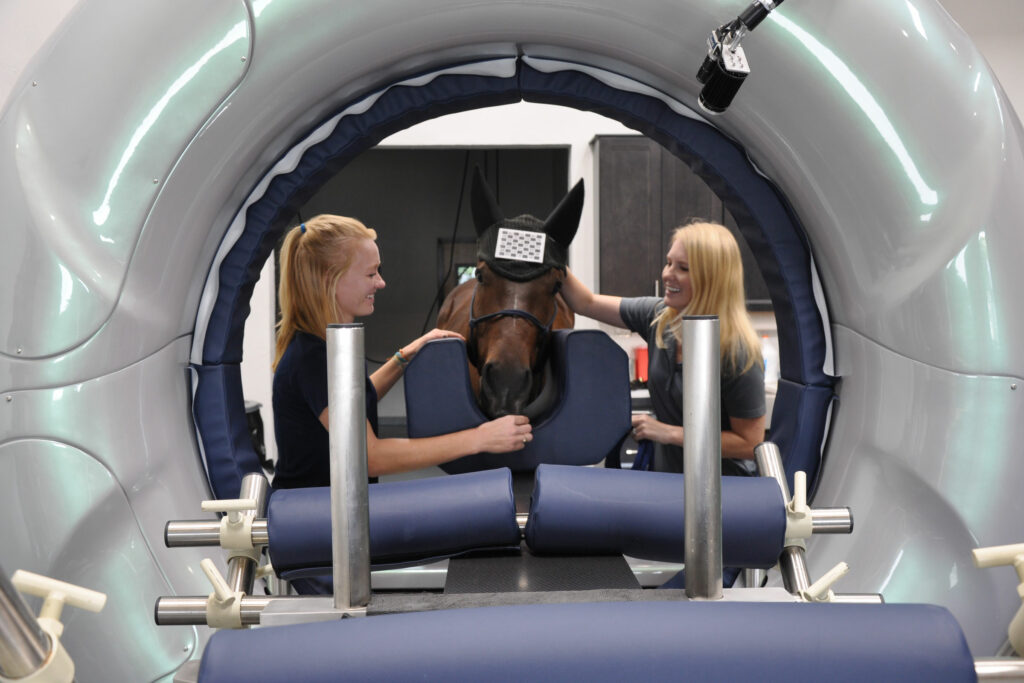
Talented Surgeons and Advanced Diagnostic Imaging
The cutting-edge services available at Palm Beach Equine Clinic are made possible by the expertise of the hospital’s talented surgeons, along with the assistance of state-of-the-art diagnostic imaging and comprehensive surgical and medical resources. The combination brings many of the best veterinarians in the world to Palm Beach Equine Clinic for assistance with their most complex cases.
Among the hospital’s features, the latest in surgical technology enables less invasive operations that result in faster recovery times for the horse. Dr. Davis explained how diagnostic imaging is used during surgery to help guide procedures and assure the best possible result.
“Magnetic Resonance Imaging (MRI) and other advanced diagnostic imaging modalities can often be used for three-dimensional mapping to help enhance the surgical technique,” he noted. “There are some fractures in particular where the surgeon can map out the exact configuration of the fracture off of the MRI scan. We are then able to place markers with the MRI to guide a more exact, refined surgery.
“Intra-operatively, x-rays are taken to view progress, particularly for fracture repairs,” Dr. Davis continued. “The digital radiographs allows us to view the fracture in two planes to ensure optimal screw placement and fracture repair. Ultrasound is also frequently used in surgery for some of the more delicate procedures, specifically with soft tissue.”
Other surgical procedures may be guided with Arthroscopy, which aids in visualization of a joint; Laparoscopy, which uses a camera inserted into the abdomen; or Endoscopy, which is used in upper airway procedures. With the most advanced diagnostic imaging technology onsite, Palm Beach Equine Clinic is the go-to hospital for equine owners and referral veterinarians from around the world during the winter season in Wellington.
Palm Beach Equine Clinic provides experience, knowledge, availability, and the very best care for its clients. Make Palm Beach Equine Clinic a part of your team! To find out more, please call 561-793-1599.
The veterinarians at Palm Beach Equine Clinic in Wellington, FL, caution horse owners of recent toxicity cases that have arisen in South Florida suspected by the low growing weed, Creeping Indigo. Although Creeping Indigo is not native to Florida and has been reportedly growing in the state since the 1920s, the plant has recently spread from the past summer’s humid conditions. Most toxic plants are not palatable to horses and therefore do not pose as much risk; however, it appears that horses are eating Creeping Indigo with suspected fatal effects. The only real treatment is to recognize and remove the poisonous plant from all grazing areas.
Palm Beach Equine Clinic’s Dr. Kathleen Timmins explained that veterinarians in South Florida are suspecting Creeping Indigo cases more often and in more places than ever before. Many people are unaware of the problems this toxic plant can cause.

Signs and Symptoms
“Toxicity from Creeping Indigo can present itself through a number of different symptoms, which can make it difficult to recognize and definitively diagnose,” Dr. Timmins noted. “There is no test or treatment, and the damage that it causes can be irreversible. The only true treatment is limiting their exposure to it.”
The most important step to avoid illness is to eradicate the plant from all pastures and grazing areas. Horse owners should walk through their property and review grass areas for the plant. Creeping Indigo is a prostrate plant that is commonly found in high traffic areas of grass, such as parking lots, turf, roadsides, medians, and overgrazed pastures. Flowers arise from the base of the leaves and are pink to salmon in color. It often grows under the grass, and when it is not flowering, it can be difficult to see. It also has a very deep root, so it is not easy to pull up.
Both neurologic and non-neurologic signs are documented, and researchers are uncertain how much Creeping Indigo a horse needs to consume before clinical signs appear.
The most notable signs are neurologic; horses may seem lethargic or have less energy than usual. Head carriage is often low, and there may be rhythmic blinking and jerking eye movements. An abnormal gait may be noticed, characterized by incoordination and weakness in all limbs.
Non-neurologic signs may include high heart and respiratory rates, high temperature, watery discharge from the eyes, discoloration of the cornea or corneal ulceration, or ulceration of the tongue and gums.
“There are so many varied symptoms that it is often not the first diagnosis you would think of,” Dr. Timmins explained. “There are also many other toxic plants, but if horses have access to good quality feed or grazing, they will not usually eat the toxic plants. The best solution is to find the plant, get rid of it, and not have to find out if it has been consumed.”
Treatment
Horses that are quickly removed from the plants may recover completely, but there is no effective treatment, and symptoms may persist. The best way to prevent poisoning is to stop access to paddocks where Creeping Indigo is present and to remove plants by physical means or herbicide application.
